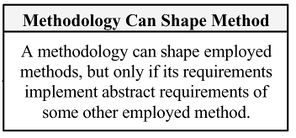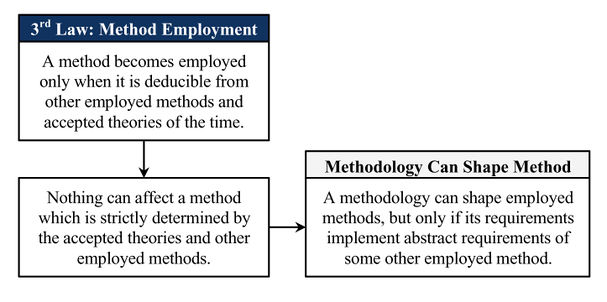Role of Methodology in Scientific Change
What role do methodologies play in scientific change? Are methodologies capable of affecting employed methods?
The explicitly prescribed requirements for theory acceptance are often different than the implicit requirements of theory acceptance within any given scientific community. It is currently accepted that the implicit expectations can change the explicit requirements. However, the question of whether methodologies can affect the implicit methods employed by a given scientific community is unsettled. Methodology Can Shape Method theorem (Barseghyan-2015) states that a methodology can influence employed methods, if its requirements implement abstract requirements of some other employed method. This raises the questions what is the role of methodologies in facilitating scientific change and can methodologies affect employed methods?
In the scientonomic context, this question was first formulated by Hakob Barseghyan in 2015. The question is currently accepted as a legitimate topic for discussion by Scientonomy community.
In Scientonomy, the accepted answer to the question is:
- A methodology can shape employed methods, but only if its requirements implement abstract requirements of some other employed method.
Contents
Broader History
Traditionally, philosophers of science have conflated the roles of methods and methodologies. This conflation can be traced back to William Whewell’s The Philosophy of Inductive Sciences, in which it is proposed that philosophy of science both describes the essence of knowledge and advocates its best methods.1 Thomas Kuhn’s conceptions of paradigms and scientific revolutions also possessed both descriptive and normative connotations.2 Similarly, Imre Lakatos’ methodology of scientific research programmes is constructed simultaneously as descriptions of methods of science and methodologies regulating what scientists ought to do.3p. 91 Many contemporary authors working in the field inherited this view from Kuhn, Lakatos and other classics of the genre.
Paul Feyerabend for instance gives many examples of how the practice of famous scientists were often at odds with the prescriptions of scientific methodologies that philosophers of science have produced over time. 4p. 14 Individual famous scientists were often used in the examples due to the assumption that their practices exemplified the expectations of the actual community.4p. 17
Larry Laudan, following Whewell and Herschell before him, clearly distinguishes the explicit prescriptions from the actual expectations scientists have.5p. 54 According to Laudan, the rhetoric of scientists occasionally diverges from the realities of the empirical sciences.
Furthermore, Laudan argues that his reticulated model is able to account for scientific change due to its piecemeal approach.5p. 62 According to this reticulated model, scientific changes can occur in theoretical level, methodological level and the axiological level with the latter being concerned with changes in the goal of the science.5p. 63 When there is a dispute, scientists use the other levels for resolution.5p. 63 Laudan believes that when scientists realize that their explicit requirements are in tension with the actual practices, scientists will change their explicit requirements.5p. 57 He gives the example of the transition from the empirical-inductivist methodology to the hypothetico-deductive model.5p. 55-56 Empirical-inductivist method was incompatible with the existence of unobservable entities. However, physicists in the 19th century has accepted the existence of numerous unobservable entities such as natural selection and gravitational force. As a result, the community changed their explicit methodology. Therefore, Laudan believes that while differences between the implicit requirements and explicitly prescribed requirements are possible but given time, the latter will harmonize with the former.
Scientonomic History
Acceptance Record of the Question
| Community | Accepted From | Acceptance Indicators | Still Accepted | Accepted Until | Rejection Indicators |
|---|---|---|---|---|---|
| Scientonomy | 1 January 2016 | This is when the community accepted its first answer to this question, Methodology Can Shape Method theorem (Barseghyan-2015), which indicates the question is itself legitimate. | Yes |
All Direct Answers
| Theory | Formulation | Formulated In |
|---|---|---|
| Methodology Can Shape Method theorem (Barseghyan-2015) | A methodology can shape employed methods, but only if its requirements implement abstract requirements of some other employed method. | 2015 |
If a direct answer to this question is missing, please click here to add it.
Accepted Direct Answers
| Community | Theory | Formulation | Accepted From | Accepted Until |
|---|---|---|---|---|
| Scientonomy | Methodology Can Shape Method theorem (Barseghyan-2015) | A methodology can shape employed methods, but only if its requirements implement abstract requirements of some other employed method. | 1 January 2016 |
Suggested Modifications
Current View
In Scientonomy, the accepted answer to the question is Methodology Can Shape Method theorem (Barseghyan-2015).
Methodology Can Shape Method theorem (Barseghyan-2015) states: "A methodology can shape employed methods, but only if its requirements implement abstract requirements of some other employed method."
A methodology can affect an employed method when it implements one or more abstract requirements of another employed method. Thus, the role normative methodology plays in the process of scientific change is a creative role, in which methods are changed through the implementation of other abstract requirements from some other employed method.
This theorem follows from former description of the third law, which states that a method becomes employed only when it is deducible from other employed methods and accepted theories of the time.
This description of the third law leaves room for methodologies’ to play an active role in scientific change in cases when a concrete method fulfills the requirements of an employed abstract method. The same abstract requirements can usually be implemented in a wide range of different ways. For instance, if there is a whole array of concrete cell counting methods all implementing the same abstract requirement that when counting the number of cells, the resulting value is acceptable only if it is obtained with an "aided" eye.6pp. 151-152 In such cases, methodology can play a decisive role in method employment; what later becomes the requirements of the employed method can be first suggested as a methodology. Thus, the double-blind trial method was first devised as a methodology, as a set of explicitly stated rules, and only after that did it become actually employed as a method of drug testing.6pp. 240-243
Sebastien (2016)'s new definition of methodology offers an alternate means for methodologies to shape methods, although this is not stated in the existing formulation of the theory. Because methodology is understood as a subkind of Normative Theory, it should be possible for the Third Law to deduce an abstract method from a set of theories including some of the normative methodologies a community holds about their method. In this way, it would be necessary for this method to take into account how the community believes its method works, in any concrete implementation of said method, just as a community takes into account descriptive theories (e.g. the placebo effect and experimenter's bias) when employing a new method.
Related Topics
This question is a subquestion of Mechanism of Scientific Change.
This topic is also related to the following topic(s):
References
- ^ Whewell, William. (1967) The Philosophy of the Inductive Sciences, Founded upon their History. Volume 1. Johnson Reprint Corp..
- ^ Kuhn, Thomas. (1962) The Structure of Scientific Revolutions. University of Chicago Press.
- ^ Lakatos (1971)
- a b Feyerabend, Paul. (1975) Against Method. New Left Books.
- a b c d e f Laudan, Larry. (1984) Science and Values. University of California Press.
- a b Barseghyan, Hakob. (2015) The Laws of Scientific Change. Springer.

